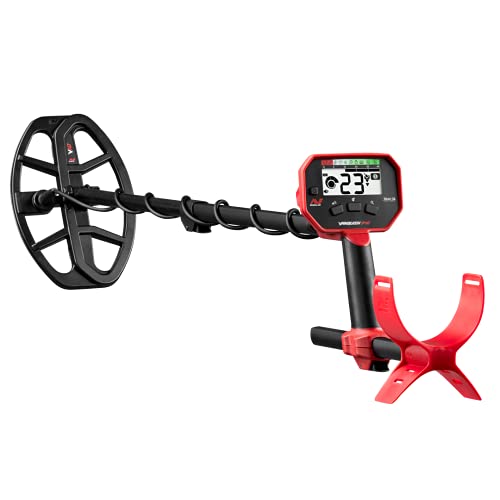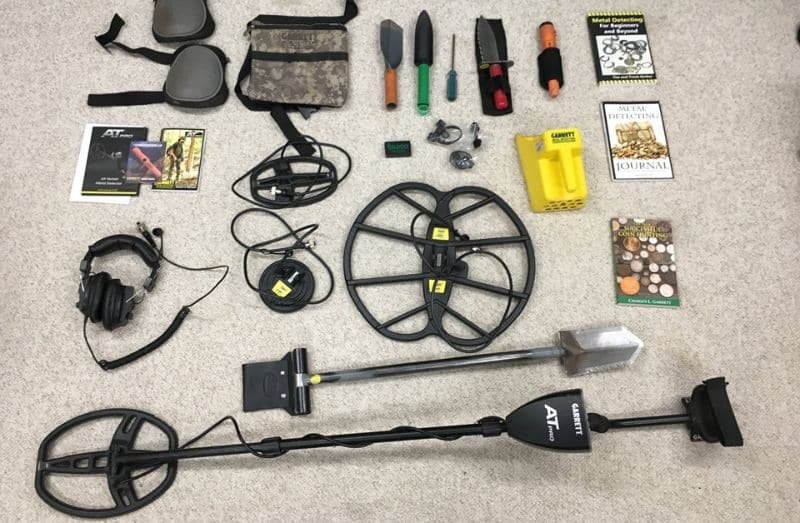Metal Detecting for Beginners
When I first began metal detecting as a hobby, I had no idea how much fun I was about to uncover—literally!
There’s something incredibly rewarding about venturing out with a metal detector in hand and searching for hidden treasures beneath the surface.
Whether you’re uncovering a lost coin, a relic from the past, or even just a bottle cap, every beep of the detector brings a sense of excitement and wonder!
**DISCLAIMER - As an Amazon Associate I earn from qualifying purchases. The links in the article are affiliate links that help support this blog and my channels. Metal Detecting Life is supported by you, the readers! When you purchase something I recommend via my links, I may get an affiliate commission (terms of service) — but it never affects the price you pay. Cheers!
A Beginner’s Guide to Metal Detecting
If you’re a beginner or considering taking up metal detecting as a hobby, this guide will help you get started. I’ll cover everything from choosing the right beginner metal detector, where to hunt, and what accessories you’ll need to help you uncover as MANY TREASURES as possible.
Plus, I’ll compare metal detecting to other hobbies like golf and fishing, so you can see why it’s such a unique and affordable option that will keep you and the whole family going on adventures for years to come.
Should I Try Metal Detecting?
I took my metal detector to an area where they were doing street construction and found old coins!
Metal detecting is more than just a hobby; it’s an adventure, which is exactly what got me started on my metal detecting journey and it may just be why you begin metal detecting too.
Here are a few reasons why you might want to give metal detecting a try:
It’s beginner-friendly: Unlike some hobbies that require steep learning curves, metal detecting is easy to pick up as long as you have the right tools and a little guidance.
It’s affordable: You don’t need to break the bank to start. Many cheap and affordable metal detectors offer excellent performance for beginners.
It’s a great way to explore: Metal detecting gets you outdoors and lets you explore parks, beaches, forests, and even historical sites.
The thrill of discovery: Finding something hidden beneath the ground, no matter its value, is incredibly satisfying.
Beginner Metal Detectors: Choosing the Right One
The key to a good start is finding the best beginner metal detector. My first metal detector (Tesoro Silver uMax - discontinued) didn’t have any fancy features and was only $200! Here are some features to look for when shopping for a beginner metal detector:
Lightweight design: A heavy detector can be tiring to use for long periods, especially for kids or beginners.
Easy-to-use controls: A simple interface is crucial for learning the ropes.
Affordability: Start with a metal detector that won’t strain your wallet. Models like the Minelab Vanquish 340 metal detector are excellent for beginners, combining affordability with functionality and power (example below under $200 currently) that make for a great beginner metal detector.
Beginner Accessories Needed to Metal Detect
Starting metal detecting doesn’t require a ton of gear, but a few accessories can make your experience much smoother and even help you increase the amount of treasure you find:
A digging tool: A sturdy trowel or small shovel will help you retrieve your finds.
A pinpointer: This handheld device helps you narrow down the exact spot of your target.
A finds pouch: You’ll want a place to store your treasures as you search.
Headphones: Many detectors work better with headphones, which also help you hear faint or very deep signals.
Places to Begin Metal Detecting
You don’t have to travel far to find great metal detecting spots. The first place I went metal detecting was my own front yard. I found a bottle cap and a quarter as my first finds and immediately I was hooked! Here are some beginner-friendly metal detecting locations to get started:
Local parks: These are perfect for practicing and often yield coins and other small treasures.
Beaches: Popular for beginners because the sand is easy to dig, and items like jewelry are often lost here.
Your yard: Don’t underestimate what could be buried right outside your door!
Old trails and wooded areas: These can reveal historical artifacts like old tools or coins.
When it comes down to selecting a place you want to go metal detect, always make sure you have permission to detect the land that you choose! Because metal detecting is a recreational activity, choosing a public space like the park or beach is almost always a sure bet that you’re able to detect there.
Laws Beginners Should Know
Before you start, it’s important to know the rules and local regulations. Here are a few legal basics:
Photo Credit: Unsplash - Clarisse Meyer
Public vs. private land: Always ask for permission before detecting on private property.
Local ordinances: Some parks and beaches have restrictions on metal detecting.
Historical sites: Detecting is often prohibited at protected historical locations such as National Parks.
Finders, keepers? Research local laws about keeping or reporting valuable finds like gold or ancient artifacts.
6 Steps to Getting Started in Metal Detecting
If I’ve peaked your interest by now and you’re ready to dig into the hobby of metal detecting, here are my 6 steps on how to get started:
Choose the right gear: Start with an affordable beginner metal detector, like the Minelab Vanquish 340 metal detector, and a few basic accessories such as a digging tool, pinpointer, and finds pouch. These will make your hunts more enjoyable and efficient.
Pick your first location: Local parks, beaches, or even your own backyard are great spots to practice. These areas are easy to access and often yield exciting finds like coins or jewelry.
Learn the ropes: Reading guides and watching online tutorials can help, but nothing beats learning from others. Finding a mentor or joining a local metal detecting club is a fantastic way to gain insights from experienced hobbyists. Clubs often organize group hunts, share tips, and can even introduce you to prime detecting spots.
Join the online community: Metal detecting forums and social media groups are treasure troves of knowledge. They’re great for asking questions, sharing your finds, and staying updated on the latest tools and techniques. Plus, the community is incredibly supportive and eager to welcome beginners.
Follow the rules: Before heading out, make sure you’re aware of local laws and obtain permission to detect on any private property.
Stay patient and persistent: Not every outing will yield a treasure, but that’s part of the adventure. The more you practice, the better you’ll get at reading signals and finding hidden gems. The thrill of the hunt will keep you coming back time and time again!
Get Everything You Need To Find Treasure!
I’ve included an entire list of recommended accessories, tools, books, etc. to help you on your metal detecting adventure!
By taking these steps, you’ll be well on your way to enjoying the thrill of metal detecting. Have fun, stay curious, and remember—keep swinging 4 the ring!
Metal Detecting vs Other Hobbies
I was an avid golfer and would often play 3 times per week. Now I’ve traded in my clubs to swing a different type of “toy.” So I bet you’re wondering how metal detecting actually stacks up against hobbies like golf or fishing? Here’s a quick breakdown:
1. Accessibility and Affordability
Metal Detecting: Requires minimal upfront investment (affordable detectors are available) and can be done almost anywhere—beaches, parks, or even backyards.
Golf: Often requires expensive equipment, green fees, and access to a course, which can be cost-prohibitive.
Fishing: Needs specialized gear, licenses, bait, and sometimes boats or specific locations.
2. Excitement and Reward
Metal Detecting: Every beep holds the potential for buried treasure—coins, relics, jewelry, or historical artifacts. The thrill of discovery keeps the hobby engaging.
Golf: While enjoyable, it can feel repetitive and frustrating for beginners trying to master complex techniques.
Fishing: Relies on patience, as success often depends on factors like weather, location, and fish activity.
3. Health Benefits
Metal Detecting: Combines walking, squatting, and digging, making it a low-impact exercise while exploring outdoor spaces and if you’re detecting in the water, it is a great form of resistance training as well.
Golf: Provides moderate exercise through walking and swinging, but often involves long pauses.
Fishing: Primarily sedentary unless it involves wading or active casting.
4. Flexibility and Independence
Metal Detecting: Can be done solo or with friends, anytime and anywhere. No need to coordinate schedules or wait for the right season.
Golf: Requires booking tee times, coordinating with others, and adhering to course rules.
Fishing: Dependent on seasons, weather, and specific locations with active fish.
5. Connection to History and Environment
Metal Detecting: Offers a unique connection to the past, as finds may have historical significance. Hobbyists often enjoy researching their discoveries.
Golf: Primarily recreational, with very little historical or exploratory aspect.
Fishing: Connects to nature but lacks the historical intrigue of metal detecting.
6. Minimal Frustration
Metal Detecting: Even if you don’t find treasure, the experience of exploring and being outdoors is rewarding.
Golf: Missing shots and struggling with techniques can lead to frustration.
Fishing: Long periods without a catch can be discouraging.
For these reasons, I think that metal detecting provides a unique combination of adventure, exercise, and reward, making it an excellent choice for hobbyists looking for flexibility, discovery, and excitement.
“So go out there and remember to “Swing4TheRing!””
What’s the coolest thing you’ve ever found while metal detecting? Share your stories in the comments below!
















